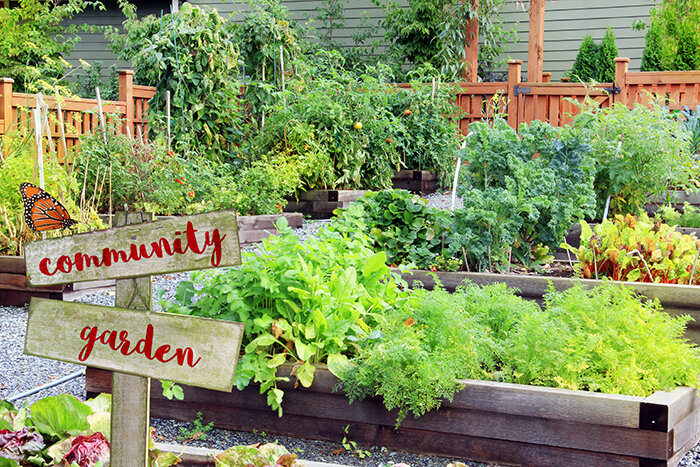
(This is the first of a two-part look at what makes up our local food system.)
Are you noticing the growing number of news reports about horrific food shortages the world over? The reasons are myriad: drought and other disasters brought about by climate change, poverty, inequity, conflict, short-sighted agricultural policies and poor health infrastructure. The heartbreaking stories that are part of the global food crisis are relentless and, at the moment, it looks as if things will only become more dire over the next many months. When I am feeling most overwhelmed at the breadth and depth of the problem, I’m guided by the maxim, “Think globally and act locally.” A local and even a neighborhood-scale lens suggests that there are things we can do.
For more than 25 years, people in Greater Lansing have been crafting strategies and developing projects that address food insecurity and hunger. Moving beyond providing emergency food relief, many local food activists see systematic strengthening of our local food system as essential to ensuring a nutritious and plentiful food supply for our citizens over the long term. Here are a few things happening locally and suggestions for how you might be a part of this:
A short-term but essential and immediate response to hunger is led by the Greater Lansing Food Bank and its well-developed network of 140 pantries serving seven counties in mid-Michigan. We are fortunate to have this 42-year-old, highly efficient organization to respond to ever-increasing numbers of food-insecure people. Its leader, Michelle Lantz, notes that a comparison of each month this year to the corresponding month in 2022 shows a consistent “21-25% increase in households accessing food banks.”
Twenty-three years ago, Allen Neighborhood Center joined that network and still administers the weekly Breadbasket Pantry for eastside Lansing residents. There are several other pantries on the east side as well as in neighborhoods throughout the city, most of them dependent on volunteers. Interested in helping out? For information on location and hours of the 140 emergency food partners, log on to greaterlansingfoodbank.org.
While providing emergency food is critical, many pantry sponsors have added programs over the years that have longer-term impacts. The first to recognize that community gardens could be a significant resource for food-insecure neighbors was the Greater Lansing Food Bank, which back in 1982 (!) established the Garden Project. As noted on its website, “The Garden Project supports a network of 95 community gardens and over 500 home gardens, helping to feed more than 8,000 people across mid-Michigan.” It does this by providing interested people with plots in one of its network of community gardens, educational workshops, free seeds, plants and other resources for home gardens, and tool lending. Garden project manager Julie Lehman reports that the number of people accessing their Foster Park-based Resource Center to create a home garden has “skyrocketed” this season. She suggests that “rising food prices and economic uncertainty are contributing factors.” While the number of backyard gardens appears to be increasing, the number of smaller community gardens fell away during the pandemic. However, total acreage tilled in the larger community gardens has actually increased — as soon as plots come available, they are snatched up by newcomers interested in growing food in the company of neighbors.
A resource that combines free food and gardening space is the Edible Garden at Hunter Park, off Kalamazoo Street on the east side. The Allen Neighborhood Center manages the project as well as the park’s year-round greenhouse. Staff, youth and volunteers grow herbs and veggies there in the area outside the fence, to which neighbors and others are invited to help themselves at any time. The center also offers the Urban Gardener Certificate Course, a six-week-long intensive class for folks who want to step up their gardening skills in order to grow more of their own food. If you are interested in learning more about this popular annual class, call (517) 367-2468 and speak to GardenHouse manager Egypt Krohn.
Over the past 15 years, we have seen the emergence of over a dozen urban farmers, particularly in the eastside’s Urbandale neighborhood, on the south side near the Hill Center, and on Nollwood Avenue off Willow Street. The Lansing Urban Farm Project, the Ingham County Land Bank, the Garden Project, the Hunter Park GardenHouse and the South Lansing Community Development Association have all played a role in incubating farmers, providing land (often non-contiguous parcels), loaning tools and generally assisting in the launch of these small, uber-local farming operations. Probably no one has provided more practical support than John Krohn, the garden program coordinator for the Ingham County Land Bank, who has linked people to land, cleared shrubs, rocks and concrete, plowed and roto-tilled. Krohn reports that “urban farming in Lansing is stronger than it’s ever been. We’ve added significant infrastructure such as hoop houses, hydrants and soil improvements. We’ve developed institutional knowledge — we know how to grow things. It will be interesting to see where this movement goes next.” One possible direction may involve more collaboration among urban farmers as reflected in the creation of “Lansing Grown,” a brand for products grown within City limits.
In my August column, we’ll pick up the discussion with a focus on current and emerging (and exciting) markets for locally grown food products. In the meantime, thank you for your interest and participation in building resilience into our local food system — one change of habit at a time.
Support City Pulse - Donate Today!
Comments
No comments on this item Please log in to comment by clicking here